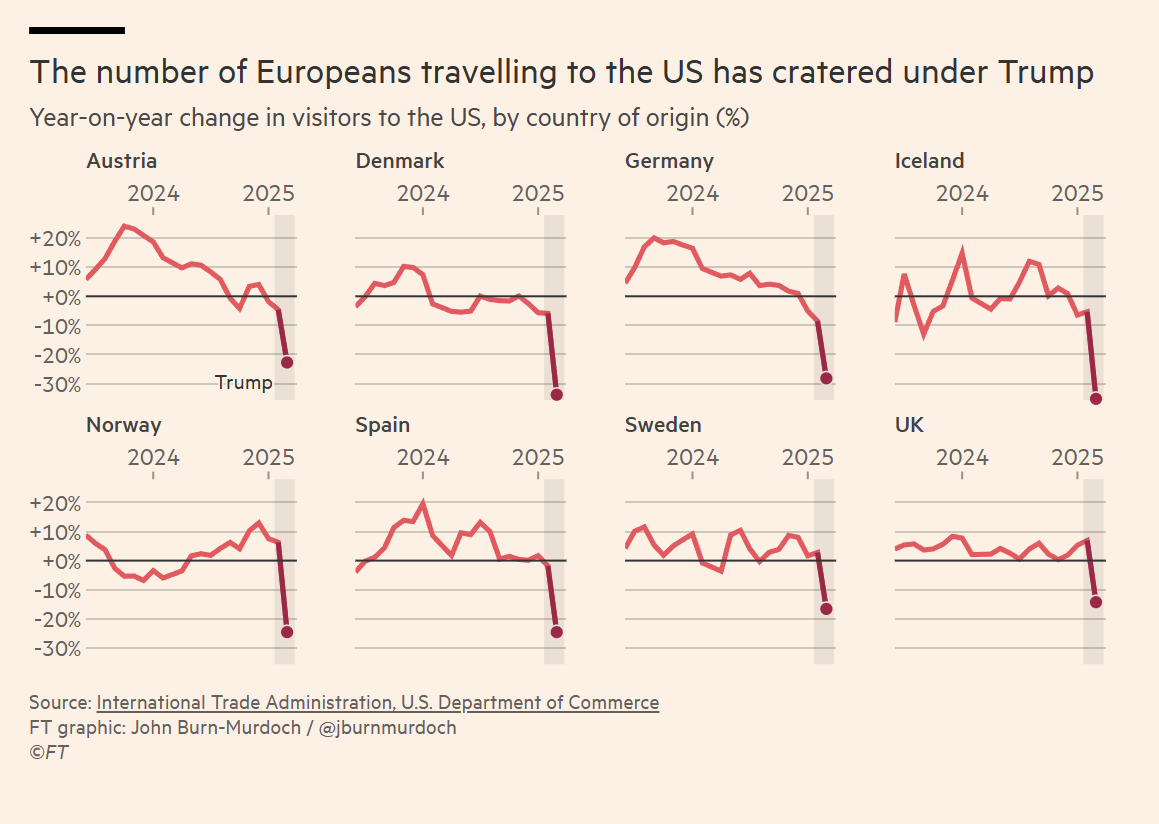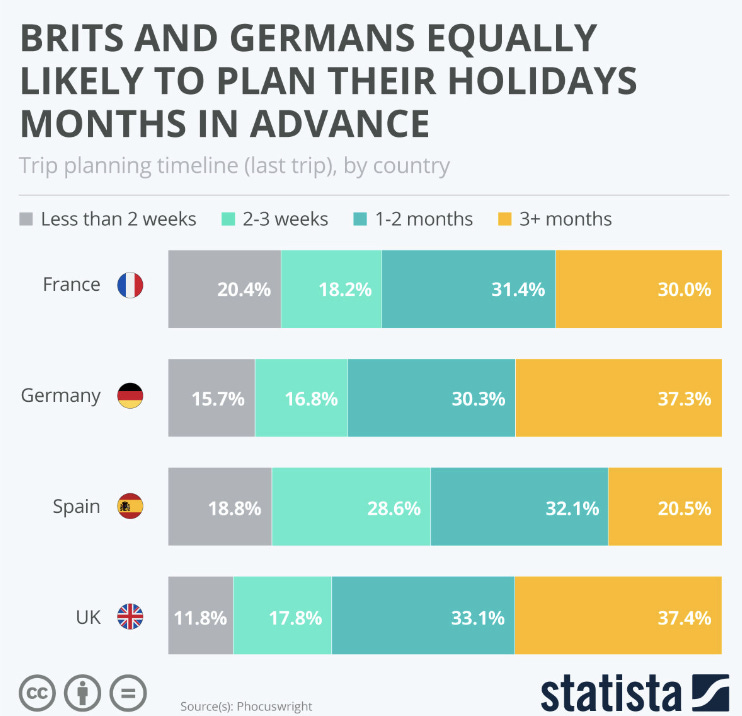How Trump Could Inadvertently Boost African Tourism
As China and Europe cool on American Travel
Here is Story to Watch.
Trump’s Policies Good For African Tourism?
Two stories published last week may indicate that Trump’s policies may indirectly benefit African tourism.
The first story is from the Financial Times, which highlights that the number of European tourists heading to the United States has fallen sharply due to “political and economic tension and fears of a hostile border.”
The chart below from the Financial Times article points this out clearly.
The second story is that the Chinese government issued a travel advisory against its citizens travelling to the United States, citing the recent "deterioration of China-U.S. economic and trade relations and the domestic security situation in the U.S.".
How could this benefit Africa?
When it comes to tourism, Europeans and Chinese are the biggest spenders in the world, aside from the United States. Based on data from UN Tourism, China leads the way by some distance, with $250 billion spent by Chinese tourists.
In the past, the US has also been the largest beneficiary of tourism in the world, receiving $215 billion in 2024 in international receipts, which represents the total money received by a country from international visitors for goods and services.
If fewer tourists from China and Europe are planning to travel to the United States due to their unease with the Trump administration, does that not create an opportunity for tourism in Africa?
According to the most recent UN data, Tourism contributes 3.2% of the GDP in Africa, behind the Middle East and Europe. This is actually on the low side, especially when you look at the dollar figures.
In 2023, tourism brought in $664 billion to Europe, $138 billion to the Middle East, and only $38 billion to Africa. In fact, the United Arab Emirates, with $51.9 billion, brought in more than Africa as a whole (this excludes countries like Egypt, which are counted as part of the Middle East’s numbers).
This clearly indicates that Tourism in Africa is a massively untapped opportunity, especially when you consider the unique value proposition that Africa offers in terms of natural wonders, wildlife, and unique food.
Where’s the Money? What’s the Move? Target European and Chinese tourists — now.
Europeans typically plan their vacations several months in advance, with peak travel generally occurring during the summer months, from June to August.
This means if you run a business in the tourism space, you should ramp up your marketing targeting European travelers right now. It may also be good to highlight that the Euro has strengthened against most African currencies, and so travel to Africa will be much cheaper.
For Chinese tourists, over and above marketing, one way to attract more visitors is to learn from luxury brands.
If you visit high-end luxury stores in travel hubs, you will likely find a salesperson who can speak Mandarin. Catering to language needs can significantly increase the prospect of attracting tourists.
Is this not worth the investment for the tourism industry, especially considering that the Chinese are the biggest spenders on tourism globally?
Perhaps adding a Mandarin translation to your hotel or even Airbnb listing could be a small gesture that goes a long way.
The Trump administration is likely to be much more inward-looking, which means the rest of the world will have to rearrange and reposition. This also applies to tourism value flows.
For Africa, this is certainly an opportunity to gain market share in an industry in which the continent should have a competitive advantage. Africa has a unique value proposition, such as wildlife and natural wonders like the Victoria Falls. Now is the time to make the most of that.
Let’s see what happens. What do you think? If you know someone in the hospitality industry, share this post with them.








Nice read as always - noticed the first link crediting FT is linking to Reuters
Good morning Tinashe - as previously undertaken to you: Our comments on your posting which is a timely reminder that there are opportunities just waiting for us all to increase our business.
Africa certainly has potential to increase the amount of travelers we can attract.
We have to ensure however that we improve our "the value" of offering. By that we mean (and we are merely using this as an illustration, not having visited Victoria Falls, which is after all one of Zimbabwe's major natural attractions together with a safari to "Wankie Game Reserve" which is not too far away) that it is not sufficient to have visitors come to Falls and leave them to their own devices while there. Suitably trained guides should be available to explain the history of the place (why its important to the local population for example), to point out the peculiarities of the flora and fauna and so on. This needs to be viva voce (ie live) so that there is an actual interaction between the visitors and the guides - not just a printed brochure (although that should also be provided to act as a keepsake). Particularly liked the suggestion of having a person proficient in at least Mandarin Chinese (or other languages of the target audience) present. That person should also advise the management on the cultural "foibles" of the target population. What about getting the visitors to submit their photos to the site - you may get photos that are better than your own! Or to share their review of the place before they leave : ie don't wait for the experience to have diminished. Find out what works for your own "attraction: in other words. (Also with particular reference to Vic Falls - Zimbabwe needs to counteract the "annual" horror stories that climate change is causing the Falls to dry up - when in fact its a seasonal phenomenon caused by change of seasons!).
Most importantly - find a niche - and do everything you can to promote your venue to that niche. For example its one thing to say "target China" - but there are over a billion people resident in China, It is preferable to focus attention on one particular sector (see below) or even location and find the local "influencer" dominant in that sector. That way your messaging can be much more targeted, and address the specific needs of the targeted niche (which obviously also means doing your "homework" on what the specific needs of that niche actually are - remember : one size does not fit all). Also your venue probably does not have the ability to deal with an influx of "billions" - so be realistic in your assessment of how many additional visitors your business can actually deal with at any given time without compromising on standards and the overall experience.
A sector that is overlooked by African venues is our suitability for international conferences (and not every conference has to be attended by 1000s of delegates to make a profitable venture) and also business "incentive" packages (ie get international companies to reward excellent performance with a trip to a venue in Africa) or trade shows (involving local business as well who get an opportunity to show case their businesses to an international market ie we can bring international markets to Africa instead of individual businesses throwing optimistic darts at the international prospects).
So some food for thought.
And since we have done that - here's an opportunity to tell you about a new book we are currently working on for publication early in May : "Tariffs and Stock Prices" - the title contains significant clues as to its subject-matter : and contains vital information for navigating the current economic environment! . Can be ordered in eMagazine format (suitable for laptops and desktop computers) from us at - legaleagles@srvalley.co.za". Put the words : Tinashe recommended this book to me" and you'll be able to purchase for only US$ 2,50 (two US Dollars and fifty cents!). We'll send the invoice with payment details.
Or if you prefer an epub version you can pre-order for only US$ 2,99 by using the following link:
https://books2read.com/u/mBdXQD
and choosing the bookseller of your choice (try "smashwords")
Kind regards
Graeme and Veldra Fraser : www.companylawtoday.co.za
email : legaleagles@srvalley.co.za